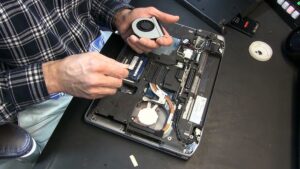Dell Service Center in Patna
Dell laptops are renowned for their reliability and performance. However, like other electronic devices, they can experience hardware failures, including hard disk issues. If you’re facing problems with your Dell laptop’s hard disk, here’s a guide to help you understand the common issues and potential solutions.

Common Dell Laptop Hard Disk Problems:
-
Slow Performance:
- Symptoms: Sluggish startup, slow application loading times, and system responsiveness.
- Causes: Fragmentation, insufficient memory, or a failing hard drive.
- Solutions:
- Defragment your hard drive regularly.
- Upgrade your RAM if necessary.
- Monitor your hard drive’s health using diagnostic tools.
-
Data Corruption:
- Symptoms: Files become inaccessible or corrupted, strange error messages, or system crashes.
- Causes: Physical damage to the hard drive, logical errors, or software conflicts.
- Solutions:
- Use data recovery software to recover lost files.
- If the issue persists, consider professional data recovery services.
-
Hard Drive Failure:
- Symptoms: Unusual noises, slow performance, frequent system crashes, or complete data loss.
- Causes: Physical damage, wear and tear, or software-related issues.
- Solutions:
- Back up your important data immediately.
- Replace the faulty hard drive with a new one.
Dell Laptop Hard Disk Repair in Patna:
If you’re located in Patna and need professional assistance with your Dell laptop’s hard disk repair, consider visiting a Dell-authorized service center. These centers have experienced technicians who can diagnose and fix various hardware issues, including hard disk problems. You can find the nearest Dell Service Center in Patna by visiting the Dell website or contacting their customer support.
Additional Tips for Dell Laptop Hard Disk Maintenance:
- Regularly back up your important data to an external hard drive or cloud storage.
- Avoid physical shocks and vibrations to your laptop.
- Keep your laptop cool and clean to prevent overheating.
- Use reliable antivirus software to protect your system from malware.
- Monitor your hard drive’s health using diagnostic tools.
